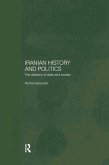The Saljuq empire was one of the most important in the mediaeval Islamic world, stretching from Central Asia to Syria during the 11th and 12th centuries. This books charts the early development of the Saljuqs from tribesmen to rulers of a great Islamic empire, demonstrating the central role of tribalism in the evolution of their state.
This book investigates the early history of the Seljuq Turks, founders of one of the most important empires of the mediaeval Islamic world, from their origins in the Eurasian steppe to their conquest of Iran, Iraq and Anatolia. The first work available in a western language on this important episode in Turkish and Islamic history, this book offers a new understanding of the emergence of this major nomadic empire Focusing on perhaps the most important and least understood phase, the transformation of the Seljuqs from tribesmen in Central Asia to rulers of a great Muslim Empire, the author examines previously neglected sources to demonstrate the central role of tribalism in the evolution of their state. The book also seeks to understand the impact of the invasions on the settled peoples of the Middle East and the beginnings of Turkish settlement in the region, which was to transform it demographically forever. Arguing that the nomadic, steppe origins of the Seljuqs were of much greater importance in determining the early development of the empire than is usually believed, this book sheds new light on the arrival of the Turks in the Islamic world. A significant contribution to our understanding of the history of the Middle East, this book will be of interest to scholars of Byzantium as well as Islamic history, as well as Islamic studies and anthropology.
Hinweis: Dieser Artikel kann nur an eine deutsche Lieferadresse ausgeliefert werden.
This book investigates the early history of the Seljuq Turks, founders of one of the most important empires of the mediaeval Islamic world, from their origins in the Eurasian steppe to their conquest of Iran, Iraq and Anatolia. The first work available in a western language on this important episode in Turkish and Islamic history, this book offers a new understanding of the emergence of this major nomadic empire Focusing on perhaps the most important and least understood phase, the transformation of the Seljuqs from tribesmen in Central Asia to rulers of a great Muslim Empire, the author examines previously neglected sources to demonstrate the central role of tribalism in the evolution of their state. The book also seeks to understand the impact of the invasions on the settled peoples of the Middle East and the beginnings of Turkish settlement in the region, which was to transform it demographically forever. Arguing that the nomadic, steppe origins of the Seljuqs were of much greater importance in determining the early development of the empire than is usually believed, this book sheds new light on the arrival of the Turks in the Islamic world. A significant contribution to our understanding of the history of the Middle East, this book will be of interest to scholars of Byzantium as well as Islamic history, as well as Islamic studies and anthropology.
Hinweis: Dieser Artikel kann nur an eine deutsche Lieferadresse ausgeliefert werden.








